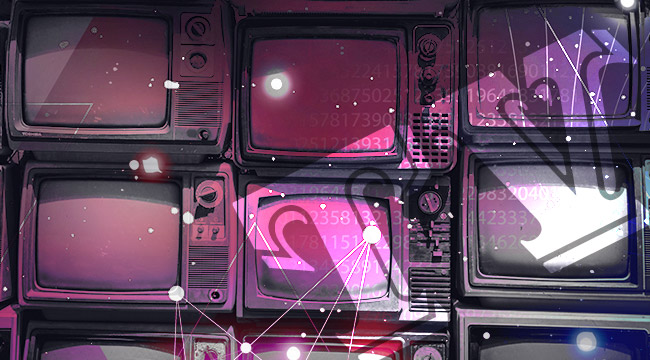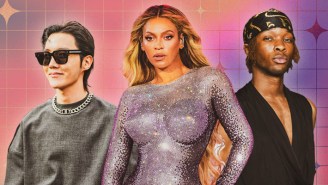
All this week, we’re taking a look at the past, present, and future of Peak TV, the current, overabundant TV golden age in which we live. As the finale, here’s a discussion between Uproxx TV editor Brian Grubb and Uproxx cultural critic Steven Hyden.
Brian: According to the research department at FX, there were 409 scripted television shows in 2015. This figure represents a significant jump from the 2014 total (376), and a really significant jump from the 2009 total (211). It’s a development that is both great and exciting (more new shows on more new outlets from more new creators) and, at times, totally overwhelming (“Aaahhhh slow down, I still haven’t finished Orange Is the New Black, I don’t have time for new shows”). Whether you call it “Peak TV” or “Too Much TV,” the reality is that there is, well, a lot of TV right now.
So, let’s talk about it and see if we can’t make a little sense of it all, or at least get in some good jokes. I’m wide open. Where do you want to start?
Steven: Hey, Brian. Let’s talk about Imaginary Mary. Have you heard about this show? It’s the one where Jenna Elfman interacts with a CGI dirty hand towel. It looks incredible.
Sorry, I’m already off-topic. To me, the core issue with Peak TV isn’t necessarily the abundance of TV, because when you have more TV, you are bound to end up with more good TV. However, I’m not sure how much great TV there is right now. There are several, perhaps even dozens, of really good shows right now. At the moment, I’m watching Halt & Catch Fire, Atlanta, Narcos, Vice Principals, Better Things, Mr. Robot, and the recently concluded The Night Of. But are any of them great? I don’t think so.
Lately, I’ve been re-watching The Sopranos, and while that show isn’t perfect —apologies to all you Massive Genius fans out there — it seems so much richer and original than many of present-day prestige shows. For one thing, The Sopranos exists before “Prestige TV” became codified with a certain set of conventions that we can all probably recognize without thinking about it. The Sopranos, in part, helped to establish those conventions — single camera, no studio audience, depressed protagonist, “down” plotlines. But The Sopranos also existed in a less crowded TV universe. It had space to stretch out and be different, because the middle was more clearly defined and provided a distinct standard to react against.
Now, the TV landscape is so vast and packed with content that it’s difficult to find the center. Which means that no show, save maybe Game of Thrones, feels all that culturally significant. Even the good shows feel sort of mundane and inessential. Stranger Things demonstrated this summer that a TV show can still organically capture the public’s imagination, but memes don’t equal artistic importance. Stranger Things is a lot of fun, but it feels ephemeral.
Here’s my question: Is this just a matter of perception? Is it possible that the sheer abundance of good shows has made “good” seem “okay” or even “mediocre”? Has TV gotten worse or is the TV audience (people like you and me) just getting bored?
Brian: I think there are probably two things going on here.
The first thing is that you’re right. Having so many prestige-y shows kind of dilutes the juice a bit. And with a lot of them — especially dramas — playing the game using similar pieces and moves, it can get a little formulaic, to the point that things that might have blown us away 10 years ago are starting to feel stale. Like, it’s now such a common thing for the second-to-last episode of a season to be the one where the big thing happens that a) we’ve been trained to see it coming, and b) the word “penultimate” makes my eye twitch. Between that and the number of shows about morally conflicted/bankrupt dudes, it’s a bit much.
It makes me think about Mad Men. I loved that show. Loved it. In large part because it was so much fun to talk about the next day. And the discussion was great because so many people — at least people I communicated with online — were watching, too. But I was watching season three of Halt and Catch Fire and I started wondering if Mad Men could even survive today as a new series, and if it could, if it would move the needle at all. It was a period drama with no big-name leads that debuted on a network best known for showing Kickboxer sequels. In a time when Meryl Streep is signing up for TV shows produced by a guy who directed a Star Wars movie, I mean… God bless.
And on that note, I also wonder if we’re over-romanticizing the shows from the early era of Peak TV. The Sopranos was a great show, for sure, but it was great in a time when fewer shows of that quality were being made. And fewer shows, period. Back then if someone said “You have to watch this show,” you got probably excited about it because it was something everyone could talk about and share. Now when someone says that to me, I find myself groaning because, like, another show I’m supposed to fit into my schedule? It’s madness.
But the second thing is that, yes, TV is definitely better. We don’t have the big water cooler shows anymore because everything and everyone is spread so thin, but look at something like BoJack Horseman. It’s a profoundly silly cartoon about a celebrity horse that is also a deep look at depression and the best Hollywood satire on television. Something that weird could only exist today, with a zillion outlets starving for content and willing to market a hyper-targeted series at a smaller audience. There’s a give and take there. We can still be wowed by TV, but it’s taking a lot more effort.
So with that in mind, here’s my next question: With so many options out there, how are you deciding what to watch and, more importantly, what to stick with? And is there anything you’re not seeing that you’d like to see? Where do we go from here, Steven?!
Steven: I’m like a lot of people, I’m sure, in that I follow the buzz. If I read a lot about a show being great, I’m probably going to watch it. At the same time, I recognize how that’s a trap, because a certain kind of show is more likely to get good press, whereas other kinds of shows that might be just as good get ignored.
For instance, I think one of the consistently enjoyable sitcoms on TV is Black-ish. Unlike a lot of so-called comedies that air on cable and streaming services, Black-ish is laugh out loud funny, as opposed to “funny,” i.e. not actually funny but sort of melancholy and self-consciously clever. But Black-ish doesn’t often get grouped with those shows because it airs on a network. The only time Black-ish got a lot of attention in the TV press was when it did a special episode on Ferguson, arguably the least funny episode of Black-ish ever. The divide between what’s considered “important” by the TV press and what people actually watch never ceases to amaze to me.
As for what I want to see: I guess I’m curious to see whether TV can re-invent itself again. It still feels like every prestige drama is working off a template that was established by The Sopranos. What will the next paradigm-shifting show look like? I have no idea? What do you think?
Brian: I’m starting to wonder if we’re headed toward a shift back to lighter, more disposable programming. In addition to the glut of Sopranos-esque shows about internally conflicted white guys who are great at their jobs and also sad a lot, one of the results of TV becoming a “respectable” outlet for “auteurs” and “so on and so forth” is that there’s been an emphasis on very serious, very heavy shows, many of which have started with a young woman getting murdered in a mysterious and/or creepy way. True Detective, The Killing, The Night Of, etc.
And it’s not just the dramas, either. Your point about Black-ish is a good one. Even comedies have started getting heavier and more dramatic than most dramas used to be. That’s not to say they’ve been bad, though. Shows like BoJack and You’re the Worst and Catastrophe and Louie and Transparent and Master of None and… sheesh, there really are a lot of examples of this kind of show. Anyway, I find them to be fascinating and often more profound than most of the dramas I watch, and I think they’re doing more than the dramas to stretch the boundaries of television right now, too. Give me a million of those instead of another Low Winter Sun or Depressed Cop with Drinking Problem and Bad Personal Life Investigates Cult.
But it also makes me miss Parks and Recreation spectacularly. The push — driven by cable and streaming outlets, mostly, as well as critical buzz — for these more dramatic comedies has resulted in fewer shows that are just light, fun half hours where everyone solves a problem and feels great about it. It’s one of the reasons I enjoy New Girl and Brooklyn Nine-Nine so much, and why I was so heartbroken when Happy Endings got canceled a few years ago. Sometimes I don’t want to have to think about murder or depression or piece together a season-long mystery based on things that may or may not have been tipped off if you freeze frame the 23-minute mark of the third episode and look in the top left corner and have also seen an independent movie from the mid-’90s that the showrunner is obsessed with. Sometimes I just wanna see Jake Johnson eat a burrito in a kiddie pool. I’m not that complicated, really.
Maybe that’s the point, though. All of those shows I just named or referenced are on TV right now or streaming somewhere where I can find them, even if they aren’t the hip buzzy ones. There’s kind of something for everyone, you know?
Steven: That’s true. There’s always something new to be found. The question is whether people have the time or inclination to find those shows. This week, Alan Sepinwall wrote about six worthwhile shows that have been lost in the shuffle during the Peak TV era. Some of these shows, like Rubicon and Enlightened, I’ve never seen. And then there’s WGN’s Manhattan, which I’d never even heard of.
Now, I can seek out those shows whenever I want, which is great. But let’s be honest — I probably won’t. There’s just too much that’s new to check out. Plus, we all have lives that exist outside of watching television, don’t we?
You said before that TV is “definitely better.” I think you’re right in terms of how TV in 2016 compares to how TV used to be. But I must circle back to my original point: “Good TV” has become the new normal. Even the crappiest TV shows are better written, better acted, and more cinematic than the crap of TV’s past. The bar has been raised. Now what?
Perhaps the latest frontier is diversifying the content, so that more and more shows are about women, people of color, LGBTQ, and pretty much anyone who isn’t a straight white male. But even diversity on television has been normalized. The miracle of Atlanta, the best new show of the fall, is how it’s a show in which virtually no white people appear, and yet it’s not treated like a big deal. In the past, a white character would’ve been shoehorned in as Donald Glover’s dorky friend because the network would’ve worried that a “mainstream audience” wouldn’t get the show without a white proxy. But now, there’s an implicit understanding that people will either accept Atlanta on its own terms, or move on. Judging by the show’s ratings, people seem to love Atlanta exactly how it is.
To me, Atlanta looks like TV’s future. It’s a low-key, niche-y show that feels like something that could air on the internet — which is probably how much of Atlanta’s audience watches TV anyway.
Is that where we’re headed? Is TV on its way to becoming the new internet? If so, is this a good thing or a bad thing?
Brian: I think, as with most things that are worthy of discussion (he says as they zoom past the 2,000-word mark), the answer is that it’s probably a little of both. It very weird out there right now. Teenagers have the entire world at their fingertips — hundreds and hundreds of shows, available in multiple formats and on multiple devices — and they are apparently obsessed with binge-watching episodes of Friends on Netflix. That will never not be the weirdest and funniest thing in the world to me. I hope they go back even further and get way into Miami Vice next. Just dozens of teenagers walking around in pastel shirts and white blazers, tapping away at some sort of cocaine smuggling app on their phones. Imagine the frantic local news reports. “Crocketting,” they’d call it. Moms would be terrified.
Anyway, yes. The result of television getting so big so fast has been that it exploded into a million tiny little pieces, and now the people who make it are targeting more content at those individual pieces instead of at the big giant faceless blob. The result, as you pointed out, is that we’re getting more shows that are inclusive and that tell stories that come from segments of the population that have been under-represented to this point. That’s good. And if it means we get more shows like Atlanta and Black-ish and Transparent out of it, then it’s double good.
But having so many shows also means we as viewers are getting spread thin and it’s harder for anything to break out. It gets overwhelming, and — both as someone who writes about TV and as someone who likes to talk about it — it does get frustrating that we don’t have many big water cooler shows that lots of people watch. The conversations have shifted from “Whoa, how ’bout that?” to “You have to start watching [insert new show],” which can get exhausting. You mentioned it earlier, and Josh wrote a nice piece about it a few months ago, but Game of Thrones is really the only show that drives a huge chunk of the conversation anymore. And there’s only two shortened seasons of that show left. Then what?
I guess what I’m saying is that I don’t have answers for you. Although I suppose there are worse problems to have than “there is too much quality content that appeals to more people than ever before.” Maybe that’s the takeaway here.






